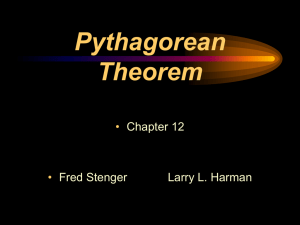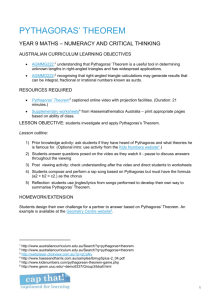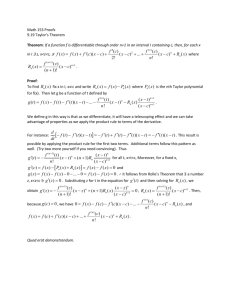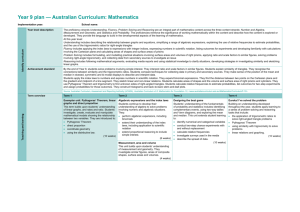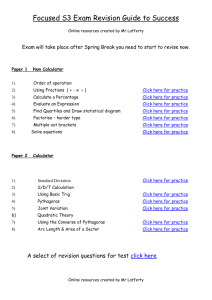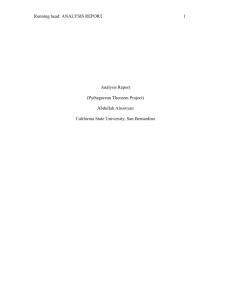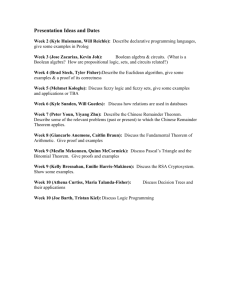Reading Booklet 1 HOT Questions
advertisement
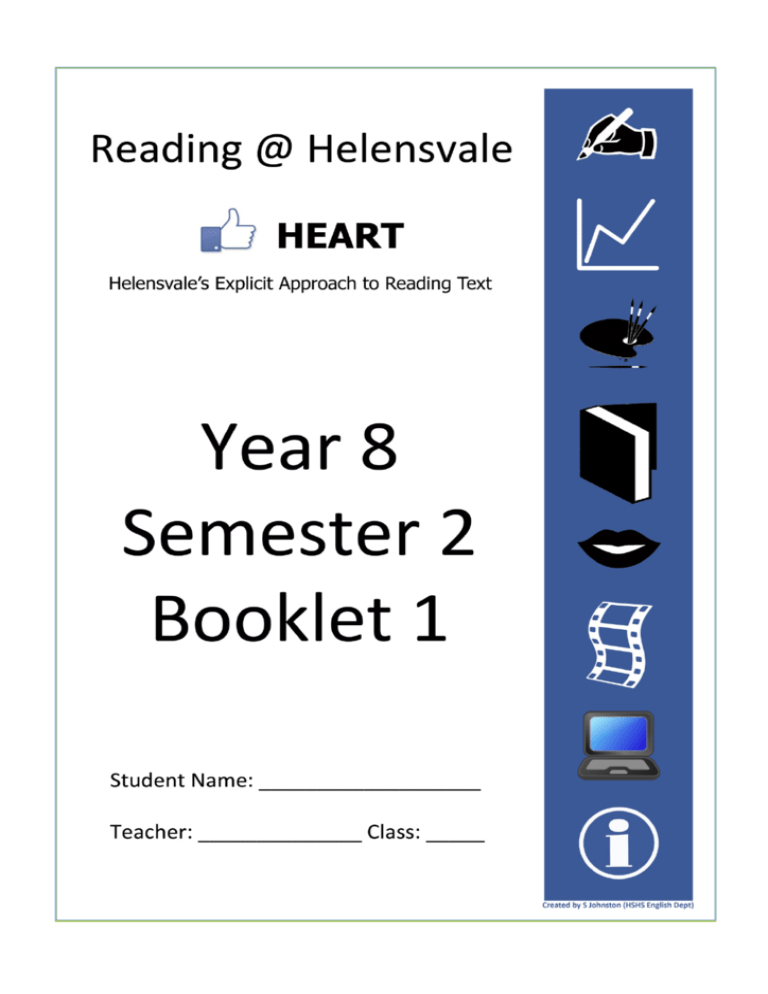
Intention of HSHS Reading Booklet
This weekly reading booklet is an activity, not a test. Students do not need to do this on their own – in fact they will benefit from using the following strategies. Students are encouraged to: Read the texts and explore the questions with parents / caregivers (discussing the possible answers) Confer and collaborate with peers Use a dictionary, thesaurus and internet to understand the meanings of words. Maths – Introduction to Pythagoras’ Theorem Pythagoras was a philosopher in ancient Greece who lived in the 6th century BCE. He studied astronomy, mathematics, music and religion, but is most well known for his famous theorem. Pythagoras was known to provide a proof for the theorem that bears his name, and methods to find Pythagorean triples, which are sets of 3 whole numbers that make up the sides of right‐angled triangles. The ancient Babylonians, 1000 years before Pythagoras’ time, and the Egyptians also knew that there was a relationship between the sides of a right‐angled triangle. Pythagoras, however, was able to clearly explain and prove the theorem using mathematical symbols. The ancient theorem is still one of the most commonly used theorems today. Pythagoras’ theorem states that the square of the hypotenuse of a right‐angled triangle is equal to the sum of the squares of the other two sides. An illustration of the theorem includes squares drawn on the sides of the right‐angled triangle. The area of the larger square (c2) is equal to the sum of the two smaller squares (a2 + b2). Higher Order Thinking Questions – Maths
Pythagoras was a philosopher in ancient Greece who lived in the 6th century BCE. Pythagoras lived during the 600s. 1 about 60 years before Christ existed. approximately 2600 years ago. approximately 2600 years before common era. Pythagoras, however, was able to clearly explain and prove the theorem using mathematical symbols. Pythagoras’ communication can be best described as 2 articulate elaborate explicit convoluted The ancient theorem is still one of the most commonly used theorems today. The theorem is antediluvian 3 immemorial ataristic all of these none of these Pythagoras’ theorem states that the square of the hypotenuse of a right‐angled triangle is equal to the sum of the squares of the other two sides. Which words are synonyms for equal in this context? (Tick all that apply) 4 identical tantamount similar equivalent indistinguishable invariable commensurate matching resembles complementary related one and the same An illustration of the theorem includes squares drawn on the sides of the right‐angled triangle. Which words are synonyms for illustration? (Tick all that apply) 5 depiction inscription exemplification diagram etching sketch drawing impression Drama ‐ Ithaca Road by Robert Kronk SCENE 2‐ DOWN THE RABBIT HOLE [Ithaca Station: a bend in a dusty creek bed, a trickle of water struggles along the bottom. A cubbyhouse is assembled around the base of an ancient ghost gum. The cubby is rough, handmade and somehow fantastic; the prow of a ship or the turret of a castle seem to appear out of the iron and wire and tree. It's difficult to tell where the tree ends and the cubby begins. There is a large, old wireless propped against the entrance to the cubby.] TILLY One of my first memories is sitting on the breezeway at Grandad's listening to the radio. We're both on the big chaise lounge; I remember my feet couldn't touch the ground and Grandad had his eyes shut, looked like he was completely asleep 'cept his head was nodding along with the radio play he was listening to. They used to make dramas and adventures and mysteries and comedies for the radio, but there's no pictures; it's just you and the words and your imagination. And words sweep over me and l'm on a ship, drenched by sea spray, the waves smashing against the prow {sounds of the sea and waves}, or standing with the miners at the Eureka Stockade as the troopers march up the hill [rifles crack, men shout], or walking lost, alone in the bush looking for home [sounds of Ithaca Station]. And sometimes I think Grandad and I aren't alone; sometimes, out of the corner of my eye, for a moment, there's someone with us. Sitting with us, listening to the radio. Sometimes, I can almost see her. And lately, out of the corner of my ear, I can hear her ... But no one else can. Higher Order Thinking Questions – Drama
[Ithaca Station: a bend in a dusty creek bed, a trickle of water struggles along the bottom. A cubbyhouse is assembled around the base of an ancient ghost gum. Which technique/s does the author use to set the scene? appraisal 6 personification alliteration none of these all of these The cubby is rough, handmade and somehow fantastic; the prow of a ship or the turret of a castle seem to appear out of the iron and wire and tree. The use of the semicolon indicates 7 a list will follow. a detail will follow. a pause must be taken. an independent clause sits on either side of it. Refer to this passage to answer questions 8 and 9 One of my first memories is sitting on the breezeway at Grandad's listening to the radio. We're both on the big chaise lounge; I remember my feet couldn't touch the ground and Grandad had his eyes shut, looked like he was completely asleep 'cept his head was nodding along with the radio play he was listening to. Explain why you think the writer starts the passage in present tense before switching to past tense. 8 ‘cept is an example of an abbreviation 9 a word from another language a typing error – it should read ‘except’ creative spelling for effect And words sweep over me and l'm on a ship, drenched by sea spray, the waves smashing against the prow {sounds of the sea and waves}, or standing with the miners at the Eureka Stockade as the troopers march up the hill [rifles crack, men shout], or walking lost, alone in the bush looking for home [sounds of Ithaca Station]. 10 The use of parenthesis is to inform the reader: of extra details of possible ideas to include of sound effects to inject of explanations for some terms Humanities ‐ How the Tokugawa shoguns controlled Japanese contacts with the outside world Selected extracts from Closed Country Edict of 1635 1. Japanese ships are strictly forbidden to leave for foreign countries. 2. No Japanese is permitted to go abroad. If there is anyone who attempts to do so secretly, he must be executed. The ship so involved must be impounded and its owner arrested, and the matter must be reported to the higher authority. 3. If any Japanese returns from overseas after residing there, he must be put to death. 8. All incoming ships must be carefully searched for the followers of the priests [Catholics]. 9. No single trading city shall be permitted to purchase all the merchandise brought by foreign ships. 10. Samurai are not permitted to purchase any goods originating from foreign ships directly from Chinese merchants in Nagasaki. 17. Ships arriving in Hirado [an island south of Nagasaki] must sell their raw silk at the price set in Nagasaki, and are not permitted to engage in business transactions until after the price is established in Nagasaki. Source: Watts, S. (2001). ‘The seclusion of Japan’. World civilisations since 1500. From http://www.wfu.edu/~watts/w03_Japancl.html Higher Order Thinking Questions – Humanities
Using Source 5 above – decide if the following statements are true or false. Circle the correct answer. 11 True / False (Refer to No. 1) Leaving the Japanese coast for a foreign land was vetoed. True / False (Refer to No. 2) Solicited endeavours to flee resulted in the infliction of lacerations. True / False (Refer to No. 8) It can be inferred Catholicism was deemed a threat. True / False (Refer to No. 10) The acquisition of merchandise from Chinese wholesalers was roused. In general, the extracts from the Closed Country Edict of 1635 can be best described as: impartial 12 oppressive lenient strict English – The Dispossessed by Oodgeroo Noonuccal Peace was yours, Australian man, with tribal laws you made, Till white Colonials stole your peace with rape and murder raid; They shot and poisoned and enslaved until, a scattered few, Only a remnant now remain, and the heart dies in you. The white man claimed your hunting grounds and you could not remain, They made you work as menials for greedy private gain; Your tribes are broken vagrants now wherever whites abide, And justice of the white man means justice to you denied. They brought you Bibles and disease, the liquor and the gun: With Christian culture such as these the white command was won. A dying race you linger on, degraded and oppressed, Outcasts in your own native land, you are the dispossessed. When Churches mean a way of life, as Christians proudly claim, And when hypocrisy is scorned and hate is counted shame, Then only shall intolerance die and old injustice cease, And white and dark as brothers find equality and peace. But oh, so long the wait has been, so slow the justice due, Courage decays for want of hope, and the heart dies in you. Higher Order Thinking Questions – English
Till white Colonials stole your peace In this context Colonials refers to the settlers 13 the British pioneers the invaders the English all of these and the heart dies in you In this context the above line refers to death by coronary heart failure 14 feeling bitter and spiteful feeling bereft and depressed feeling closed to change They made you work as menials Which words are synonyms for menials in this context? 15 labourers overseers monarchs workhorses servants masters slaves custodians Your tribes are broken vagrants now Which words are synonyms for vagrants in this context? 16 17 adventurers drifters floaters wanderers seekers travellers Outcasts in your own native land, This line uses situational irony. This means the exact opposite to what you expect to happen, happens. Explain how the poet has used situational irony for effect.

